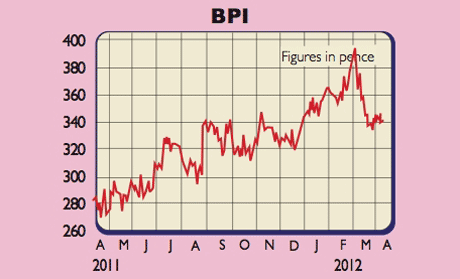Get the latest financial news, insights and expert analysis from our award-winning MoneyWeek team, to help you understand what really matters when it comes to your finances.
You are now subscribed
Your newsletter sign-up was successful
Want to add more newsletters?

Twice daily
MoneyWeek
Get the latest financial news, insights and expert analysis from our award-winning MoneyWeek team, to help you understand what really matters when it comes to your finances.

Four times a week
Look After My Bills
Sign up to our free money-saving newsletter, filled with the latest news and expert advice to help you find the best tips and deals for managing your bills. Start saving today!
2011 was a challenging year for Britain's industrial and construction sectors. That's why domestic volumes fell 5% for polythene films maker British Polythene Industries (BPI). However, regardless of testing conditions, which were compounded by rising input prices, BPI's figures for 2011 were impressive.
Turnover was up 6% to £508m as higher raw material costs were passed on to customers. Underlying earnings per share (EPS) rose 22% to 46.9p, with net borrowings closing £15m lower at £31m.
Fortunately the company saw this soft patch coming and reacted quickly. It has now closed three factories (Stockton, Brampton and Swansea) and refocused on higher value added products. Capacity is now much better aligned to demand, so that when a sustained economic upturn gets under way the group should generate even stronger returns.
MoneyWeek
Subscribe to MoneyWeek today and get your first six magazine issues absolutely FREE

Sign up to Money Morning
Don't miss the latest investment and personal finances news, market analysis, plus money-saving tips with our free twice-daily newsletter
Don't miss the latest investment and personal finances news, market analysis, plus money-saving tips with our free twice-daily newsletter
BPI has also expanded (66% of EBITA) into mainland Europe and America, where it provides farmers with crop covers, large sacks and bale/silage wraps. Granted this year's growing season is unlikely to be quite as long as in 2011, but the firm should still benefit as depleted stocks have yet to be replenished.
Of its revenues, 35% are generated from agricultural/horticultural, with another 31% coming from food retail, where it sells stretch wrap for pallets and bags for fresh and frozen ingredients. Add on 7% for the healthcare and waste sectors and all told the group derives 73% of its business from relatively defensive areas. That is helping to lift its return on capital employed to 15.5%.
British Polythene Industries (LSE: BPI)

This figure could continue to move higher, thanks to the firm's expertise in recycling polythene. This reduces overall costs and improves resource utilisation.
For 2012 house broker Investec is forecasting turnover and underlying earnings per share (EPS) of £518m and 50.4p respectively, rising to £529m and 52.3p in 2013. That puts the stock on a frugal price-to-earnings (p/e) ratio of less than seven, with a dividend yield of 3.6%. I would rate the stock on a ten-times EBITA multiple. Adjusted for net debt of £31m and a £61m pension deficit that delivers an intrinsic worth of 450p.
Margins could be affected by raw material costs and a shortened harvesting season, but it should be able to tough these out. The next trading statement is due out in May.
Rating: SPECULATIVE BUY at 340p (market capitalisation £90m)
Get the latest financial news, insights and expert analysis from our award-winning MoneyWeek team, to help you understand what really matters when it comes to your finances.
Paul gained a degree in electrical engineering and went on to qualify as a chartered management accountant. He has extensive corporate finance and investment experience and is a member of the Securities Institute.
Over the past 16 years Paul has held top-level financial management and M&A roles for blue-chip companies such as O2, GKN and Unilever. He is now director of his own capital investment and consultancy firm, PMH Capital Limited.
Paul is an expert at analysing companies in new, fast-growing markets, and is an extremely shrewd stock-picker.
-
 New PM Sanae Takaichi has a mandate and a plan to boost Japan's economy
New PM Sanae Takaichi has a mandate and a plan to boost Japan's economyOpinion Markets applauded new prime minister Sanae Takaichi’s victory – and Japan's economy and stockmarket have further to climb, says Merryn Somerset Webb
-
 Plan 2 student loans: a tax on aspiration?
Plan 2 student loans: a tax on aspiration?The Plan 2 student loan system is not only unfair, but introduces perverse incentives that act as a brake on growth and productivity. Change is overdue, says Simon Wilson